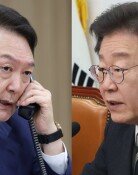Seoul must deal with provocations from Pyongyang, Beijing, and Moscow
Seoul must deal with provocations from Pyongyang, Beijing, and Moscow
Posted July. 30, 2019 07:28,
Updated July. 30, 2019 07:28
The chief representatives of North Korean nuclear talks from South Korea, the United States, and Japan are attending the ASENAN Regional Forum, which will be kicked off Tuesday in Bangkok, Thailand. The event in Bangkok will likely lead to a tripartite consultation between working-level officials on nuclear negotiations, after potential talks between South Korea and Japan, and among South Korea, Japan, and the United States at a foreign-ministerial level at the venue. Experts say that while the recent wrangles between Tokyo and Seoul are causing a chasm on the three countries’ cooperation front, a minimum level of consensus was built around the need to strengthen their cooperation in the face of various security threats to North East Asia.
Despite South Korea-Japan history dispute, South Korea, the United States, and Japan have established a security cooperation system against the expansion of China and Russia, based upon the shared values of liberal democracy and market economy. The friction between Japan and Korea has revealed a crack in the tripartite cooperation system, and the North, Russia, and China are increasingly beefing up their security collaborations. Pyongyang’s latest ballistic missile provocation and the invasion of Chinese and Russian fight jets into the territorial skies of Dokdo Islet and the East Sea are a testimony to the importance of security cooperation among Seoul, Washington, and Tokyo.
North Korea is scheming to drive a wedge in the ROK-U.S. alliance, employing a flagrant strategy to dialogue with Washington while shunning any conversation with Seoul. Having launched a ballistic missile capable of reaching any part of South Korea, North Korean leader Kim Jong Un was quick to call it a “warning against the South," and U.S. President Donald Trump made it clear he didn’t care about the security of Koreans, responding “(the missile) wasn’t targeting America," which shows Pyongyang’s strategy is paying off.
After the failed February talks in Hanoi, Pyongyang shifted its top priority in negotiations with Washington from lifting the sanctions on North Korea to security guarantee of the regime. Against this backdrop, Beijing and Moscow are actively backing it up, with a view to changing the security frame of the North East Asian region. The precondition Pyongyang proposed for working-level talks, the suspension of ROK-U.S. joint military exercises and the ban on introduction of high-tech weapons, serves Pyongyang’s interests as well as China and Russia’s strategic interests. That said, it would be far-fetched to consider it as a mere coincidence that the joint flight training between China and Russia came up right before North Korea’s latest missile provocation.
Under those dire circumstances, however, the South Korean government insists on handling the matter covertly. It fears if any measure it takes might affect the nuclear talks with the Northern neighbor. This makes South Korea a toothless, invisible country. In the coldblooded dynamics of international relations, it takes more than traveling around the borders back and forth to escape the status of a fringe third party. Resolving North Korean nuclear issues, bringing peace to the peninsula, and establishing a new order in the region are tasks only possible when South Korea is firmly standing on its feet in maintaining the ROK-U.S. alliance and the cooperation with Washington and Tokyo. This is also why we must pay a careful attention to the current conflicts with Japan to prevent them morphing into a security problem that will decide the fate of the two neighbors.
Headline News
- Med professors announce intention to leave hospitals starting Thursday
- Bridge honoring Sgt. Moon Jae-sik unveiled in Pennsylvania
- Chief of Staff Chung tells presidential secretaries to stay away from politics
- US FTC bans noncompete agreements
- N. Korea launches cyberattacks on S. Korea's defense companies







